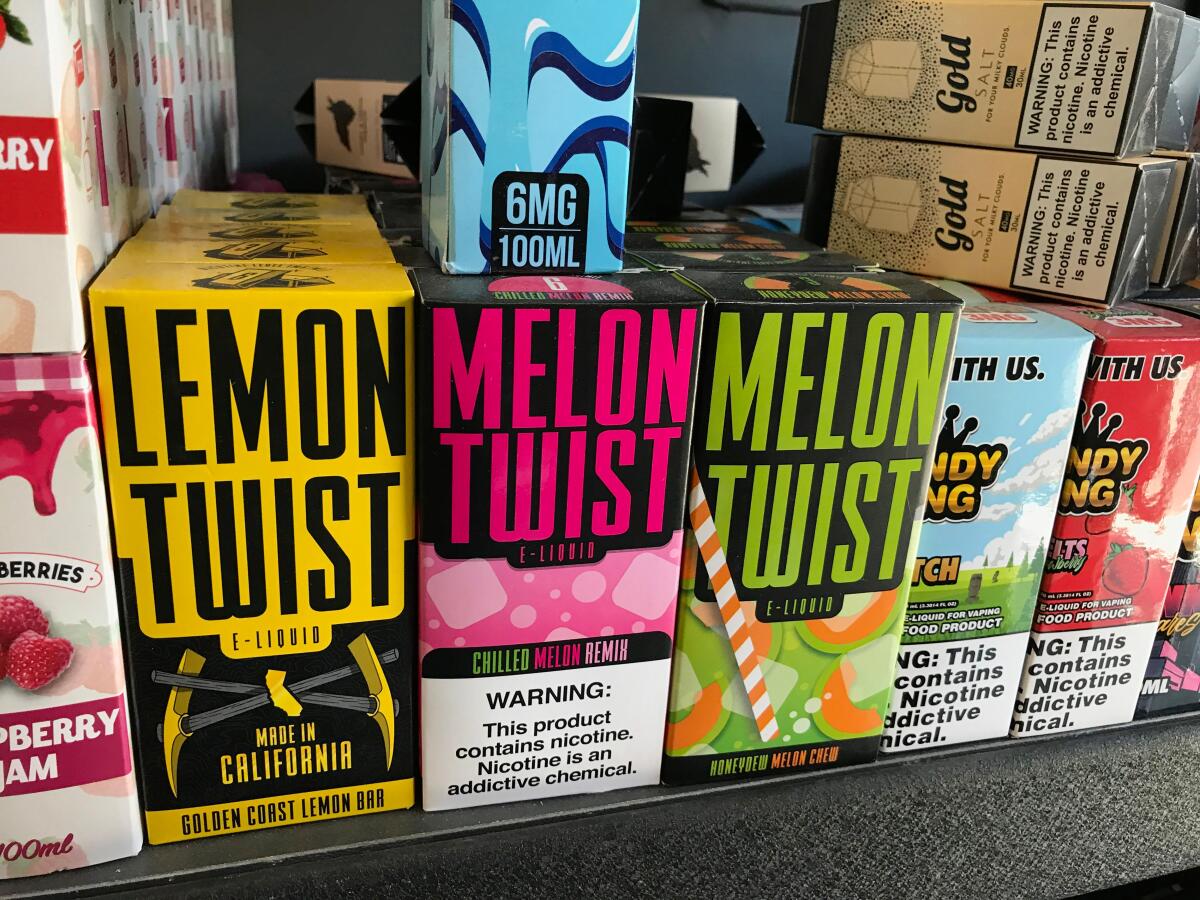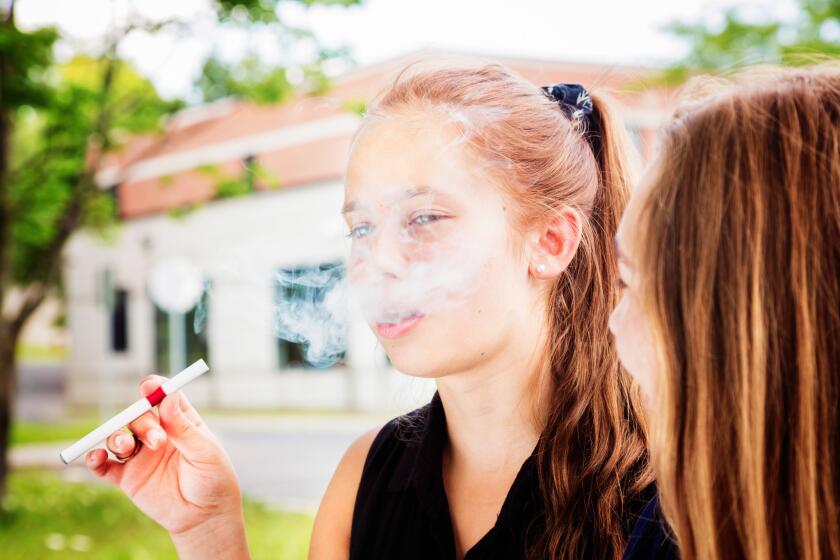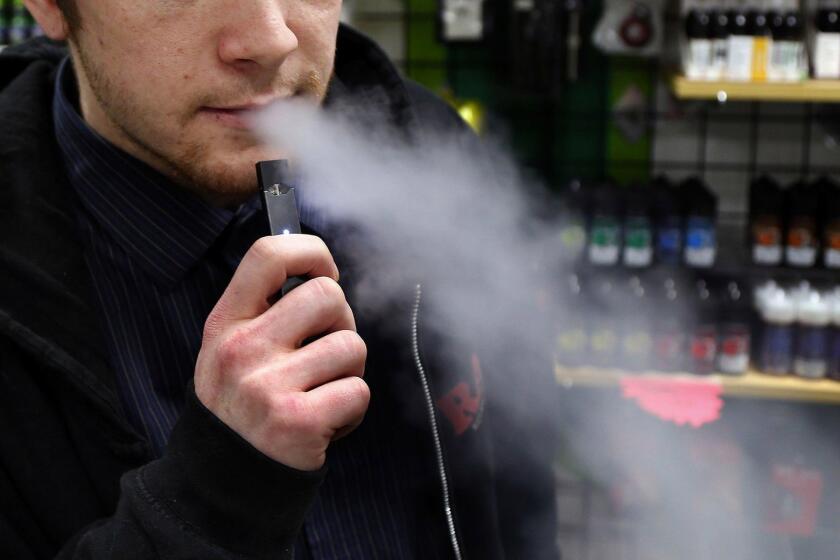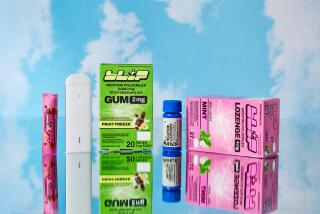Trump administration imposes ban on some, but not all, vaping flavors in retreat on earlier plan

The Trump administration announced plans on Thursday for a temporary ban on many candy- and fruit-flavored e-cigarettes, retreating from a previous, stricter proposal intended to curb an epidemic of vaping among teens.
The decision means that manufacturers of certain vaping products, such as youth-friendly flavor pods, must stop selling the products within 30 days of the ban. If they want to resume sales, they will need to convince the Food and Drug Administration that the pod flavors are safe and appropriate for the public.
But the new ban does not extend to refillable, tank-based vaping systems purchased in most vape shops, which users can fill with flavored e-liquid. It also excludes menthol-flavored cartridges. Together, the two exemptions represent a major retreat from an earlier White House plan to bar all flavors other than tobacco.
The new policy will also leave Juul, the leading e-cigarette among teens, largely untouched. The company suspended nationwide sales of sweet flavors like mango and cucumber in October, then added mint to the list in November. It still sells menthol pods.
In fact, the ban on sweet-flavored pods sold by smaller manufacturers could actually benefit Juul by eliminating competition in the e-cigarette industry, anti-tobacco advocates say.
“Our action today seeks to strike the right public health balance by maintaining e-cigarettes as a potential offramp for adults using combustible tobacco while ensuring these products don’t provide an onramp to nicotine addiction for our youth,” the Department of Health and Human Services said in a statement on Thursday.
But public health experts have warned that if menthol vaping products remain permitted, teens using other flavors will simply switch to menthol, and manufacturers will modify or rebrand other flavors to fit the mold.
About two-thirds of high school students who vape use menthol or mint flavors, making them nearly as popular as fruity flavors, according to this year’s National Youth Tobacco Survey.
Alex Azar, the secretary of Health and Human Services, announced the administration’s intent to limit vaping flavors in September. At the time, he said the flavor ban “would include mint and menthol.”
Meanwhile, the exempt tank-based systems — which allow users to customize their own flavors before filling the vaping reservoir — line the shelves in thousands of vape shops.
The new decision to focus on sweet pre-filled cartridges “creates a giant loophole that benefits Juul — the company that created the youth epidemic — and irresponsible vape shops, and leaves America’s kids at risk,” said Matthew Myers, the president of the Campaign for Tobacco-Free Kids.
“The e-cigarette policy announced today by the Trump administration breaks the administration’s promise to kids and families to eliminate the flavored e-cigarettes that are driving an epidemic of youth nicotine addiction,” he added.
Despite the softened policy, vaping advocates showed frustration. As the presidential motorcade returned to Mar-a-Lago from a golf course on Thursday afternoon, dozens of demonstrators chanted, “We vape! We vote!”
Pediatricians, public health experts and even the first lady have been pushing for strong action on teen vaping, which has erased years of progress on reducing youth tobacco use. The latest Monitoring the Future report found that 14% of high school seniors had vaped in the last month, and 8% of them said they were “hooked” on vaping. Both of those figures were up sharply from the previous year.
Conservative groups, meanwhile, urged the president to soften the planned crackdown, with some explicitly warning that a flavor ban could ruin his chances of reelection.
The retreat is reminiscent of Trump’s vow to strengthen gun regulations in August after a string of mass shootings, only to back down in the face of industry opposition.
The FDA tried to ban flavors years before the vaping outbreak. Top Obama officials rejected the plan
In just 46 days, over 100 tobacco advocates helped nix the ban on flavored e-cigarettes that might have prevented addiction in teens. Here’s how.
The flavor ban comes amid skyrocketing rates of e-cigarette use among teenagers across the country. The Centers for Disease Control and Prevention says that 5.4 million middle and high school students were vaping in 2019.
Hundreds of thousands of those young people will develop a nicotine addiction and ultimately switch to smoking regular cigarettes, according to researchers. Cigarette smoking greatly increases the risk of heart disease, stroke, lung cancer, respiratory diseases and a variety of other chronic conditions.
The flavor ban comes amid an outbreak of more than 2,500 cases of a lung disease linked to vaping. Last month, health officials said vitamin E acetate was responsible for the “vast majority” of cases, most of which involved cartridges containing the marijuana chemical THC. At least 54 people have died in the outbreak.
Documents reviewed by The Times reveal that the chemical formula that makes Juul so palatable and addictive dates back more than four decades — to Reynolds’ tobacco laboratories.
The epidemic of teenage vaping has been building for years. During the Obama administration, FDA officials noticed a drastic uptick in youth e-cigarette use and attempted to implement a vaping flavor ban more than four years ago, a Times investigation found.
A draft of the proposed rule stated that any flavored e-cigarette fluid would have to be removed from the market within 90 days. Regulators cited copious evidence for the move. For instance, in a 2014 survey that asked young people who vaped why they did it, more than 80% marked the answer, “It comes in flavors I like.”
More than 100 tobacco industry lobbyists and small-business advocates mobilized to defeat the proposed flavor ban. Senior Obama administration officials ultimately sided with them and overruled the FDA, The Times reported.
“We had deep respect for the science-based agencies. In this case, the science wasn’t clear,” Cecilia Muñoz, who headed President Obama’s Domestic Policy Council at the time, told The Times. “The question was: Is it reasonable to effectively shut down all of these vape shops and businesses when the benefits and harms were still inconclusive?”
Teens who vape using fruity flavors are more likely to continue vaping, and to inhale more during each session.
When Trump announced his intent to ban all vaping flavors in September, he said it would protect “innocent children.”
“They’re coming home and they’re saying, ‘Mom, I want to vape,’” the president said. “It’s something that, frankly, should have been looked into a few years ago in a much more advanced way.”
The first signs of a possible retreat came two days later, via Twitter.
“While I like the Vaping alternative to Cigarettes, we need to make sure this alternative is SAFE for ALL!” Trump tweeted. “Let’s get counterfeits off the market, and keep young children from Vaping!”
On Tuesday, Trump told reporters at Mar-a-Lago that he expected an announcement “very shortly” and that “the flavors are going to be checked. We have to protect the children. We have to protect the families.”
Times staff writer Noah Bierman contributed to this report.
More to Read
Get the L.A. Times Politics newsletter
Deeply reported insights into legislation, politics and policy from Sacramento, Washington and beyond. In your inbox three times per week.
You may occasionally receive promotional content from the Los Angeles Times.














